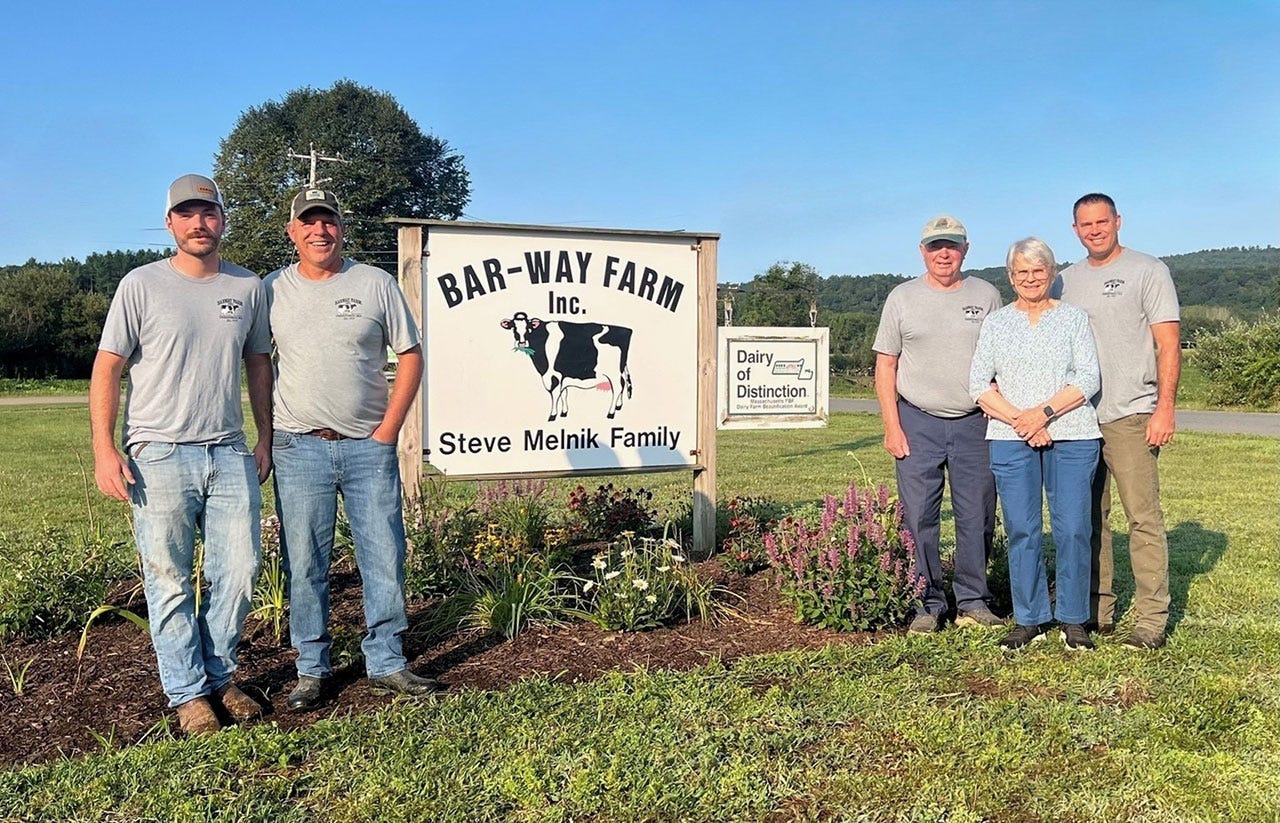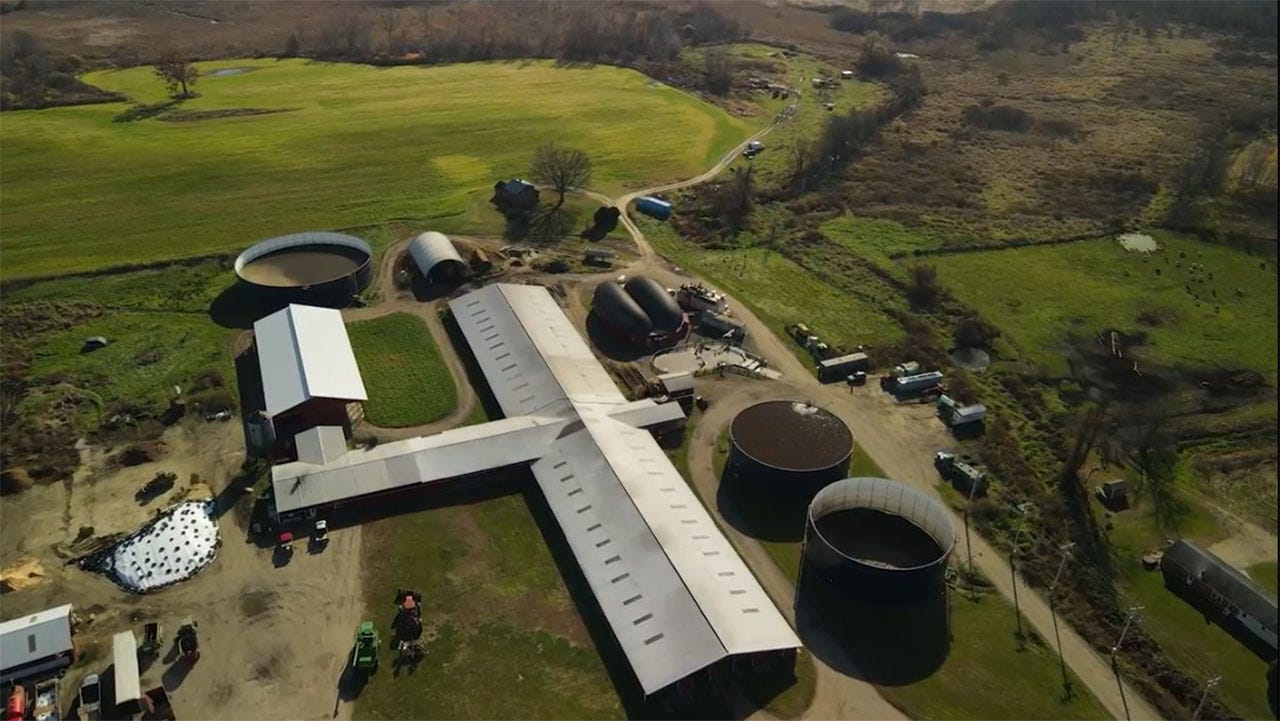The COVID-19 pandemic changed a lot of things for a lot of people.
At Bar-Way Farm in Deerfield, Mass., it launched a new era of a farm that’s been in business since 1919. Now, the younger generation is leaving its mark, helping preserve the dairy and continuing the farm’s tradition of adapting technology to its advantage.
“What it really comes down to for us is that commitment from the next generation,” says Peter Melnik, general manager of the farm and its fourth generation. “You know, my brother is 10 years younger than I am. My son's 20-something years younger than me. So, these guys are going to be here for a while, and this is sort of the path that they really wanted to take.”
Come November, the 400-cow dairy will have a brand-new double-12 parallel milking parlor with the latest technology installed. It’s being driven by Peter’s younger brother, Mark, and Peter’s son, Henry, who returned to the farm just around the time the world shut down in 2020.
Mark, 46, who is 10 years younger than Peter, returned to the farm after his job selling fertilizer and organics slowed down during the pandemic. At the same time, Henry, who was in high school and entering his senior year in the fall of 2020, had become disillusioned with the idea of more remote learning.
“We went back to school the next fall, and I don't know, as I was looking toward college and moving somewhere, I wasn't thrilled by the aspect of maybe having to do remote learning at the campus or living somewhere and having to study remotely,” Henry recalls.
While he graduated high school in 2021, his future was uncertain.
“He said, ‘I think I need to take a year off and see what happens,'” Peter recalls. “He just wanted to see how things unfolded in his life, but also in the world at that point.”
But something unexpected happened. Henry fell in love with the farm. He didn’t want to leave for college anymore. He wanted to stay home.
Quick impact
Peter soon discovered that both Mark and Henry wanted to leave their own marks. They both saw the farm’s future in adapting more technology.
“[Henry] was really pushing for getting into some GPS for doing fieldwork and planting,” Peter says. “So that was our first step. We bought a tractor that had the technology, and then that has progressed on the agronomy side and on the fieldwork side."
The farm’s new Case Magnum tractor comes with all the latest in precision technologies.
Mark upgraded the farm’s self-propelled Willmar sprayer by connecting it to a smartphone app that records where it sprays and what chemicals are used. They also started using a cow monitoring system for heat and rumination, “and that's been working fantastically as it’s helped our breeding program,” Peter says.
Forage quality is a big focus of the farm. “We try to keep purchase feed cost to 25% of the milk check, and we’ve been really growing good-quality forages,” Peter says.
The farm grows 900 acres of forages, including triticale that’s planted in fall, corn silage and alfalfa.
Henry oversees cropping. He runs a John Deere 1770 planter with downforce and precision monitoring for corn; a Great Plains 1500 drill for planting alfalfa and cover crops; and a Claas 980 forage harvester with a 10-row head for harvesting.
Electric drives and hydraulic downforce on the planter are the next upgrades he’s planning. He recently purchased a new vertical tillage machine that also provides improved efficiency. All in all, the upgrades, he says, make for a much simpler and shorter planting window.
“I would say we cover a lot more acres in a lot less hours than we ever used to,” Henry says. “Or at least the same hours with a lot more acres. So, that’s been huge.”

Growing for the future
The improvements on the cropping side have fueled improvements on the milking side, Peter says.
The Holstein herd produces about 75 pounds of milk per head and averages 4.3% butterfat and 3.3% protein. But he hopes production will improve even more once the new parlor is installed in November.
“By going to three-times-a-day milking and continuing improving the breeding program and some of the other comfort issues that we're addressing, we're hoping to get another 10 pounds of milk out of the cows in the near future. So, that's our goal,” Peter says.
The new facility, which is a retrofit, will include brand-new activity monitors for the cows, real-time milk tracking, automatic sorting gates and robotic feed pushers. The plans are to eventually expand the herd to 600 or 700 milking head in the future.
“So, I'm kind of excited to see how that technology will bring us to that next level,” Peter says.

Improving with intention
While all these improvements cost a lot of money, Peter says it’s all about setting up the business for the future.
That was his goal when he returned to the farm in 1992 and started planting cover crops. It was also his goal when he partnered with Vanguard Renewables in 2016 to build a 1-megawatt anaerobic digester on the farm, and when he teamed up with local business Bear Path Compost to produce a compost for home gardeners.
“I think that is really one of the things that has made our farm successful is that the older generation has always let the younger ones take some ownership in responsibility and in planning because, you know, they're the ones that will pay off this thing. This milking system is going to be there. It's their thing,” he says.
“The digester, that was my thing, and some of the other sustainability things that we were trying with were things that I got behind. And this is definitely about growing the herd and focusing on milk production, and all of that is really the thing that they are excited about.”
Henry says he is excited about the improvements, too, but he knows the work is never done.
“I’m just looking at doing a better job using technology and better practices for the land, for the cows,” he says. “That's sort of what I would say would be my goal. By no means have we reached where we need to be. But that's part of being why it's so rewarding, is that you're just consistently dealing with new things and new challenges and finding new ways to get at it.”